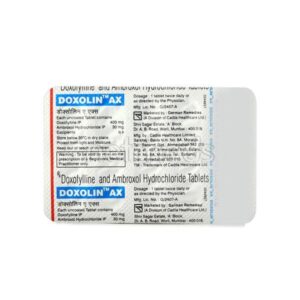AMBROXOL + DOXOPHYLLINE
Ambroxol: Ambroxol is a medication commonly used as a mucolytic agent to help loosen and expel respiratory secretions in conditions such as cough, bronchitis, and other respiratory tract disorders. It is also used as an adjuvant therapy for the treatment of respiratory conditions associated with excessive mucus production.
The primary mechanism of action of Ambroxol is thought to be the stimulation of the serous cells in the respiratory tract, leading to increased production of thin and less viscid mucus. It also promotes the activity of ciliated cells, enhancing the clearance of mucus from the airways.
Ambroxol is typically taken orally in the form of tablets or syrups. The recommended dosage for adults and children over 12 years of age is usually 30 mg three times a day. For children aged 6 to 12 years, a reduced dosage of 15 mg three times a day is commonly prescribed.
Like any medication, Ambroxol can cause side effects in some individuals. The most common side effects associated with its use include gastrointestinal disturbances such as nausea, vomiting, diarrhea, and abdominal pain. Rarely, allergic reactions such as skin rashes, itching, or swelling may occur in some people. It is advisable to consult a healthcare professional if any side effects are experienced or if there are concerns about its use.
Doxophylline: Doxophylline is a drug primarily used in the treatment of asthma and other respiratory conditions. It belongs to the class of drugs known as methylxanthines.
Its main mechanism of action is the relaxation of the smooth muscles in the airways, which helps to reduce bronchoconstriction and improve airflow. This allows for easier breathing and alleviates symptoms associated with asthma, such as wheezing and shortness of breath.
Doxophylline is available in tablet form and is typically taken orally. The usual recommended dose for adults is 400-800 mg per day, divided into two or three doses. However, the specific dosage may vary depending on the individual’s condition and the prescribing doctor’s instructions. It is important to follow the prescribed dose and duration of treatment as instructed.
Common side effects of doxophylline may include nausea, vomiting, headache, dizziness, stomach discomfort, and heartburn. These side effects are usually mild and transient. However, more severe side effects such as allergic reactions, irregular heartbeat, or seizures may occur but are rare. It is important to report any persistent or concerning side effects to a healthcare professional.
Doxophylline is not recommended for use in individuals with a known hypersensitivity to the drug or other methylxanthines. It should also be used with caution in individuals with pre-existing heart conditions, gastric ulcers, liver or kidney impairment, as well as in pregnant or breastfeeding women.
As with any medication, it is essential to consult with a healthcare professional for proper guidance, including dosing, potential drug interactions, and any specific precautions or contraindications before starting doxophylline therapy.



